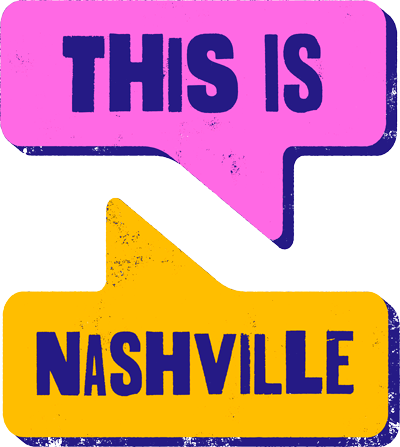
On a Wednesday evening in October 2021, the Gideon’s Army violence interrupters are making their rounds in the Cumberland View public housing complex.
As the sun starts to set, the area is calm. A group of shirtless kids is playing basketball. People are chatting on the lawn and ambling down the sidewalks. Some stop by to say hi to Hambino Godbody, the leader of the group.
“What up, sister?” Godbody asks one woman as she walks past us. “How you doing?”
 Samantha Max WPLN News
Samantha Max WPLN NewsGideon’s Army violence interrupter Hambino Godbody plays football with kids at the Cumberland View apartments in North Nashville in October 2021.
A lot of the time, Godbody says, this is what “violence interruption” looks like: just being out in the community, talking to people.
“Violence interruption is bigger than standing in between guns, trying to catch bullets,” he says. “It’s all about bringing some kind of love and respect and peace to communities that’s not familiar with that kind of love, respect and peace.”
That means organizing community suppers. Playing football with kids when they get home from school. Getting people mattresses and groceries and other things they need.
“People are out here living in poverty. And poverty creates a whole kind of headless — a whole lot of headless conditions,” Godbody says. “It’s all about just seeing the people as being redeemable and not giving up on them. So, that’s the difference between us and whoever else.”
Tonight, the team is huddled on the sidewalk beside the red brick low-rises of Cumberland View, which many residents call Dodge City, as in: dodge the bullets.
“This is, like, one of the most dangerous communities — was one of the most dangerous communities in Nashville,” Godbody says.
Cumberland View sits on the northern edge of the 37208 ZIP code. A higher percentage of the children who grew up in 37208 in the 1980s have gone to prison than in any other ZIP code in the country.
Godbody was one of those kids. These days, he leads a group of men who work to prevent shootings in the North Nashville community where they were raised. The violence interruption team is modeled after a program that started in Chicago called Cure Violence, which calls for a public health approach to community safety.
Taking an ‘epidemic approach’ to violence prevention
Gary Slutkin spent years working to prevent the spread of infectious diseases with the World Health Organization. But when he came back to the U.S. in the 1990s, he noticed a different type of virus. He thought violence, just like cholera or HIV, was spreading like a disease.
“What’s the greatest predictor of a violent event? A preceding violent event. What’s the greatest predictor of flu? A preceding case of flu. COVID? A preceding case of COVID. It just fits right in,” says Slutkin, an epidemiologist and the founder of Cure Violence.
“It’s an epidemic process, so it needs to be managed through an epidemic approach.”
Slutkin says the best way to stop the spread is to change people’s behaviors: prevent violence beforehand, not punish people afterward. And he argues that can be done by gathering a team of people from the community who have strong relationships with residents. They’re a mix of volunteers and paid employees who all go through training.
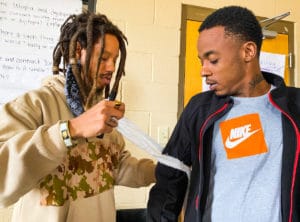 Samantha Max WPLN News
Samantha Max WPLN NewsViolence interrupters Darrius Hall, left, and T practice dressing wounds at a training in November.
These are the “credible messengers” — credible because they were once the ones with guns. But now they’re back in their neighborhood, unarmed, using their street cred to convince people not to shoot.
“You know them when you talk to them,” Cumberland View resident Kenneth Clayton says. “You feel like they can relate to what we’re saying, where we come from, because we’re all from the same place.”
Resident Michelle Fox says she trusts the violence interrupters more than she trusts public officials.
“I’ll go to Gideon’s Army before I go to the police station,” she says. “Gideon’s Army is the government, if you ask me.”
Mixed success in an era of spiking violent crime
This approach to public safety is not new. It’s been around for decades. But it is fairly new to Nashville.
Gideon’s Army brought the Cure Violence model to Cumberland View in 2019. The next year, police data show, violent crimes went up, during a countywide surge. But then, they dropped in the neighborhood last year — even as they continued to rise overall in the county.
Gideon’s Army has said that not a single person was shot in the housing complex over a 10-month period after the program started, which a police spokesperson confirmed to WPLN News last March.
But there were shots fired when no one got hit, and the group has been criticized for not counting those incidents.
A NewsChannel 5 investigation last fall suggested Gideon’s Army exaggerated its success. The reporting also scrutinized the group for hiring Cleveland Shaw, an alleged former gang member who ended up getting killed in a shootout.
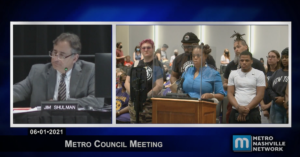 Screenshot Courtesy Metro Nashville YouTube
Screenshot Courtesy Metro Nashville YouTubeGideon’s Army speaks about violence interruption at a Metro Council meeting in June 2021.
The takeaway was that an organization that claimed it was making North Nashville safer might actually be making the community more dangerous. All this happened as Gideon’s Army was hoping to get money from the city for its violence interruption program.
The mayor’s office recently allocated several million dollars for nonprofits working to prevent violence in Davidson County, like Gideon’s Army. The TV stories suggested the group could not be trusted with the funds. Some other organizations working to prevent violence agreed.
‘I’ve begged for money so many times’
“We have to do it right, with training, assessment and evaluation, because if we don’t do it with those things, we could actually end up in a worse place,” says Jamel Campbell-Gooch, one of the leaders of the Black Nashville Assembly.
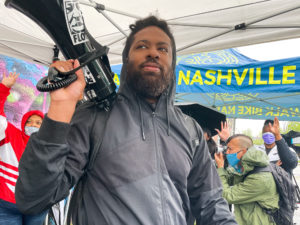 Paige Pfleger WPLN News
Paige Pfleger WPLN NewsCommunity organizer Jamel Campbell-Gooch leads a protest in North Nashville. File.
Until recently, he was the number two at Gideon’s Army. He also helped to start its violence interruption program.
But Campbell-Gooch left his job at the nonprofit a few weeks before the news stories published.
“We had members of Gideon’s Army that was literally hurting other community members,” he says. “And the leadership would not take action.”
Campbell-Gooch was uncomfortable with how the organization handled the death of Cleveland Shaw, who was training to join the violence interruption team when he was killed in a shootout last spring. Violence interrupters are supposed to be unarmed.
Gideon’s Army says Campbell-Gooch was fired for unrelated reasons and provided correspondence documenting his termination.
Campbell-Gooch worries the organization could jeopardize all violence interruption efforts in Nashville. That includes his plans to create a city-run network of grassroots groups.
“Without that foundation, we’ll end up in a situation where we don’t have a credible violence interruption program across the city,” he says.
After the TV stories aired, Campbell-Gooch and other grassroots organizers held a press conference to set themselves apart from Gideon’s Army. They wanted the city’s money to be spread more evenly between the many groups working to curb violence.
“You keep putting that same money in one egg basket, Humpty Dumpty done broke all the eggs,” Clemmie Greenlee of the violence prevention group Nashville Peacemakers said. “I’ve begged for money so many times. So, if I’m still standing here without anybody’s money, what is that telling you?”
More: Hear Greenlee and other Nashville residents discuss how to keep community safe on WPLN’s daily show, This Is Nashville.
The fight for funding was heating up, and people like Greenlee saw Gideon’s Army as a darling of the people in power who would be doling out the money.
It had not always been that way. A Republican political ad once called them “extremists” and “radicals.”
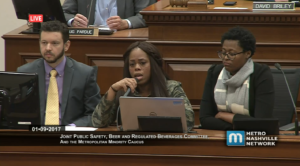 Screenshot Courtesy MetroNashville YouTube
Screenshot Courtesy MetroNashville YouTubeRasheedat Fetuga testifies at City Hall several months after Gideon’s Army released the Driving While Black report.
After Gideon’s Army released the Driving While Black report in 2016, which found Nashville police were stopping and searching Black drivers at disproportionate rates, the police chief at the time called their work “morally disingenuous.”
But then the 2020 tornado swept through North Nashville.
Suddenly, Gideon’s Army was handing out meals and clothing and finding places for people to stay. That started to draw more attention than its calls to defund the police.
“Nashville watched us respond to the tornado,” founder Rasheedat Fetuga says. “They watched us be in public housing communities that nobody wanted to be in at night with no lights.”
The tornado hit just a few months after Gideon’s Army launched its violence interruption program. They hadn’t raised all the money they needed, so they had hired fewer employees with less training.
“We basically built this plane while it was flying,” Fetuga says.
She couldn’t wait for more funding to come around.
“I just felt like if I jumped, I would fly, and if I crashed, I crash,” she says. “But I’m going to get back up because, like, these are my kids.”
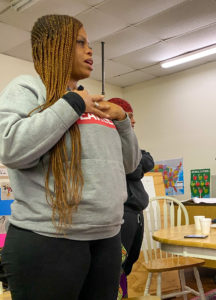 Samantha Max WPLN News
Samantha Max WPLN NewsGideon’s Army founder Rasheedat Fetuga speaks at a community meeting in North Nashville in November 2021.
Fetuga is a former Metro Schools teacher. She started Gideon’s Army to try to save her students’ lives.
“One of my kids was killed,” Fetuga says. “And he told me when he was 8 years old that he would die before he saw 18.”
That student, Lamar Hughes, was killed in September 2010, when he was 16 years old. At his funeral, Fetuga says, she promised herself she would spend the rest of her life working to prevent more killings.
But after years of consoling grieving families — even grieving her own loved ones — she didn’t see many city officials feeling the same urgency she did to stop the bleeding.
“What is reported out is numbers. They are data,” Fetuga says. “But what is not reflected is their lives, the pain that they experience, and how alone and abandoned they feel by this city as they go through these traumas and nothing changes.”
Fetuga disputes how the group has been portrayed in the TV stories. But she says there are things she would have done differently, especially with more time and resources.
“I’m always looking at how to do things better,” she says. “I’m always looking at how to be better, how to be able to give more. It’s just really hard to do that on a shoestring budget.”
‘We wish we could save everybody’
Local historian Learotha Williams says the government response to violence — both in Nashville and across the country — is “wholly inadequate.”
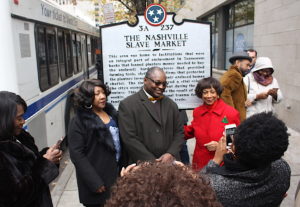 Tony Gonzalez WPLN News (File)
Tony Gonzalez WPLN News (File)Nashville historian Learotha Williams, center, led the push to create a historical marker for the former Nashville slave market.
“When you think about a million dollars and consider what the city’s budget is, you know, that’s just a drop in the well of a problem that affects the entire city,” he says.
The Tennessee State University professor has made it his mission to inform the public about Nashville’s past, including the decisions made before that have contributed to the inequities we see today. Williams says officials often settle on short-term remedies, instead of thinking more deeply about the root issues driving violence.
“Is it poverty? Is it perhaps some actions or things that we are doing that discriminate both directly and indirectly against Black people?” he wonders. “We have to take a look at the schools, jobs, housing and our history of dealing with it.”
Last month, the city started to accept applications for a $1.75 million violence interruption pilot program in North Nashville. That is compared to the approximately $240 million that went to policing this past year. Multiple groups will likely be vying for the same small pot of money.
Nonprofits have until late April to apply. The city’s new Community Safety Partnership Fund Advisory Board will choose the recipients later this year.
In the meantime, the work from Gideon’s Army continues — with or without city funding.
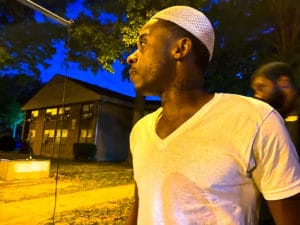 Samantha Max WPLN News
Samantha Max WPLN NewsT says it takes more than training to be ready for a job like this. “It’s just in you,” he says.
In Cumberland View on that Wednesday night last fall, a violence interrupter who goes by T tells me he broke up a fight just a couple weeks earlier. He says it was a dispute between two groups of guys.
There were “guns everywhere,” T says. “So I didn’t know if I wasn’t going to make it home then.”
T says he’s used to being around people with guns. He grew up with it. But that doesn’t make this work easy. In the back of his head, he’s always wondering what people will do.
“At the end of the day, when I come out, put my shoes on, drop my kids off at school, my goal is to come to work, do my job and pick my kids up from school, because they’re expecting that,” T says. “But, the job I do, one day I may not be able to pick them up no more.”
Godbody, the leader of the team, says that’s just part of the job.
“You just got to be fearless out here because, you know, your life on the line,” he says.
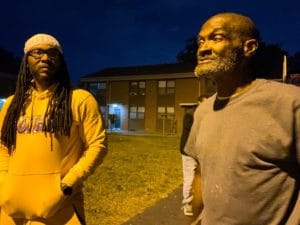 Samantha Max WPLN News
Samantha Max WPLN NewsHambino Godbody chats with a longtime resident at the Cumberland View apartments in October 2021.
Godbody notes that the violence interrupters are the ones patrolling the neighborhood tonight — not the police, who have a precinct just a couple blocks away. He says if someone started shooting right now, the violence interrupters wouldn’t run from the gunshots.
“We make sure the kids safe. We’re going to make sure you safe,” Godbody say. “You know, that’s the difference. We out here.”
I ask Godbody what the hardest part of his job is. He pauses.
“Losing life,” he tells me. “We wish we could save everybody, even though we know we can’t.”
Godbody starts to tell me about the time in his life when he was “ignorant.”
“I could have just listened, and my life would have been better,” he starts to say, but then stops mid-thought. Kids are running to him, screaming.
“There was a shooting!” the children yell.
“What did you say?” Godbody asks.
“They shooting!”
Godbody calls the kids over. They say the shooting was back where we were just a few minutes earlier.
Godbody gets on the phone and starts hustling toward the scene. By now, adults are shrieking for their kids to get inside.
No one gets hit by the bullets that night. But the gunshots send a chill through the community all the same.
On nights like this, founder Rasheedat Fetuga is sad. She’s frustrated. She knows there are not enough violence interrupters to be in all places at all times. That means shootings are still something the residents of Cumberland View have to worry about.
The process isn’t perfect, Fetuga says. But she’s still hopeful.
“It’s really beginning to shift community culture,” she says. “When you’re looking from the outside in, that’s something that might be hard to see. But when you’re here, and you are here in the midst and there’s a shooting and a child runs from the other part of the neighborhood over to find the violence interrupters, to say, ‘Come over here,’ in the middle of a shooting, and ‘Fix this and make us safe,’ that’s invaluable. That’s invaluable.”
WPLN’s Paige Pfleger contributed reporting.
Update: This story has been updated to include Gideon’s Army’s explanation for Jamel Campbell-Gooch’s departure from the organization. They say he was fired and provided documentation of his termination.


